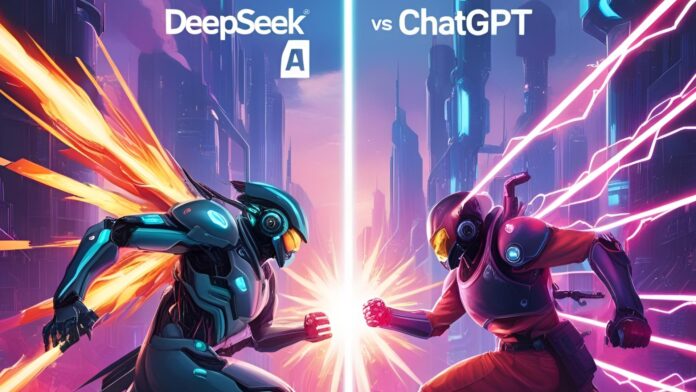Artificial Intelligence (AI) has revolutionized the way we work, learn, and create. Among the leading AI language models, DeepSeek and ChatGPT have emerged as two of the most powerful tools, each with its unique strengths and capabilities. But which one is right for you? In this comprehensive comparison, we’ll break down the key differences, strengths, and weaknesses of DeepSeek and ChatGPT to help you decide which AI tool deserves a spot in your workflow.
Whether you’re a developer, content creator, researcher, or business professional, this guide will help you navigate the AI landscape and choose the best tool for your needs.
The Rise of DeepSeek: A Game-Changer in AI
DeepSeek has quickly gained attention as a formidable challenger to ChatGPT, offering a fresh perspective on AI language models. As an open-source alternative, DeepSeek is not only cost-efficient but also excels in technical and mathematical domains, making it a favorite among developers and data scientists. Its innovative Mixture-of-Experts (MoE) architecture allows it to activate only the most relevant parameters for each task, optimizing performance and resource usage.
On the other hand, ChatGPT, developed by OpenAI, continues to dominate the AI space with its versatile features, user-friendly interface, and strong contextual understanding. But with DeepSeek’s rapid advancements, the competition is heating up. Let’s dive into the details.
DeepSeek vs. ChatGPT: Key Differences
Here’s a breakdown of the major differences between these two AI giants:
1. Model Architecture
- DeepSeek: Uses a Mixture-of-Experts (MoE) approach, activating only a subset of its 671 billion parameters for each task. This makes it highly efficient and adaptable, especially for technical queries.
- ChatGPT: Relies on a traditional transformer model, which uses all parameters for every task. While consistent, it can be less efficient compared to DeepSeek’s selective approach.
2. Performance Strengths
- DeepSeek: Shines in technical and mathematical tasks, boasting a 90% accuracy rate in math-related problems. It’s also faster for structured queries and excels in coding tasks.
- ChatGPT: Offers broader versatility, with strong capabilities in understanding context, generating conversational content, and handling creative tasks.
3. Accessibility and Cost
- DeepSeek: As an open-source platform, it’s free to use and highly customizable, making it ideal for developers and tech-savvy users.
- ChatGPT: Operates on a freemium model, with basic features available for free and advanced capabilities requiring a subscription.
4. User Experience
- DeepSeek: Requires technical expertise to fully leverage its customization options, making it less intuitive for casual users.
- ChatGPT: Known for its user-friendly interface, it’s accessible to beginners and non-technical users alike.
5. Privacy and Ethics
- DeepSeek: While cost-effective, its data storage practices and stricter content moderation policies may raise concerns for privacy-conscious users.
- ChatGPT: Adheres to Western data protection standards, making it a safer choice for handling sensitive information.
Feature-by-Feature Comparison
Let’s compare DeepSeek and ChatGPT across key features to help you decide which tool suits your needs:
| Feature | DeepSeek | ChatGPT | Winner |
|---|---|---|---|
| Writing Assistance | Excels in technical writing and precise documentation | Produces engaging, conversational content with rich context | ChatGPT |
| Coding & Tech Tasks | Faster code generation and superior performance in mathematical computations | Detailed explanations and better for learning complex implementations | DeepSeek |
| Creativity | Provides fewer but more in-depth solutions | Generates diverse ideas and approaches | ChatGPT |
| Research & Learning | Concise and precise, ideal for quick reference | Offers comprehensive, tutorial-style explanations | ChatGPT |
| Cost Efficiency | Open-source and free to use | Subscription-based with usage limits | DeepSeek |
| Privacy | Some compliance concerns | Strong adherence to Western privacy standards | ChatGPT |
Pros and Cons at a Glance
Here’s a quick summary of the strengths and weaknesses of each platform:
DeepSeek
- Pros:
- Open-source and cost-effective
- Superior performance in coding and math tasks
- Faster response times for structured queries
- Cons:
- Requires technical expertise
- Stricter content moderation policies
- Potential biases in sensitive topics
ChatGPT
- Pros:
- User-friendly interface
- Strong contextual understanding
- Better for creative and general tasks
- Cons:
- Subscription required for advanced features
- Slower for technical computations
- Higher computational costs
Which AI Should You Choose?
The choice between DeepSeek and ChatGPT depends on your specific needs and use case:
- For Developers and Technical Users: DeepSeek is the clear winner, offering superior performance in coding, math, and technical tasks. Its open-source nature and cost-efficiency make it ideal for developers and data scientists.
- For Content Creators and Businesses: ChatGPT’s versatility, user-friendly interface, and strong contextual understanding make it the better choice for creating engaging content, reports, and presentations.
- For Privacy-Conscious Users: ChatGPT’s adherence to Western data protection standards makes it the safer option for handling sensitive information.
Final Verdict
Both DeepSeek and ChatGPT are powerful AI tools, but they cater to different needs. If you prioritize technical performance, cost-efficiency, and customization, DeepSeek is the way to go. However, if you value user-friendliness, versatility, and strong privacy standards, ChatGPT is the better choice.
As AI continues to evolve, both platforms are likely to introduce new features and improvements. Stay tuned for updates, and don’t forget to share your thoughts in the comments below! Which AI tool do you prefer, and why? Let’s start the conversation.










